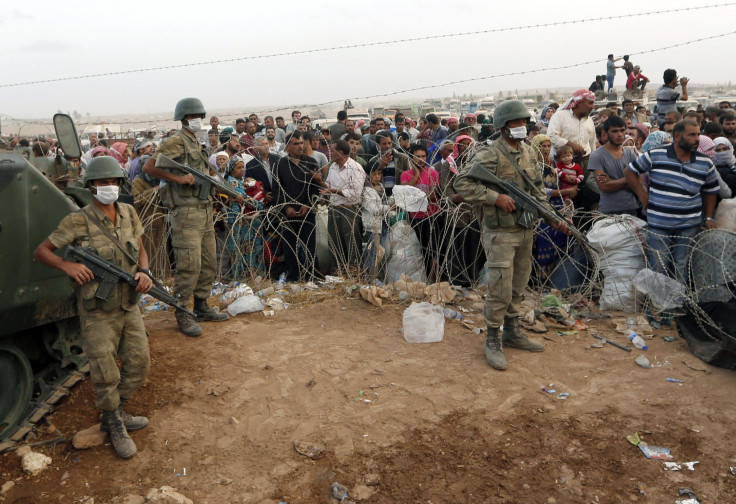ISIS Militants Advance As Turkey Considers Ground Troops In Iraq, Syria

As Islamic State militants fight their way toward the Syrian-Turkish border, the Turkish government is considering sending ground forces to combat the extremists in Iraq and Syria. The Turkish parliament is scheduled to vote Thursday on legislation that would send ground troops, open military bases in Turkey to foreign forces and establish a no-fly zone over Syrian airspace, Deputy Prime Minister Bülent Arınç said. If passed, this move would significantly bolster the U.S.-led coalition to combat the group, also known as ISIS or ISIL.
Despite being a member of NATO, Turkey has been reluctant to announce any active role in the U.S.-led coalition. The militants’ recent advances may leave them no option. Militants reportedly surrounded Suleyman Shah’s Tomb in Aleppo, Syria, Tuesday and threatened the dozens of Turkish soldiers who have been guarding Turkey’s sovereign monument since April, Agence-France Presse reported. ISIS has also reportedly seized 325 villages and towns on the way to the border, prompting Turkey to deploy hundreds of soldiers and tanks in advance of the parliamentary vote.
A pro-government Turkish newspaper reported Turkish guards at the tomb faced at least 1,000 ISIS militants, but the Turkish government has not confirmed those numbers. Shah is the grandfather of the founder of the Ottoman Empire and his tomb has been Turkish territory since the 1920s.
If militants do succeed in taking the tomb, it could cause enough “outrage” for Turkey to justify “the invasion and occupation of Syria,” said Kori Schake, a research fellow at the Hoover Institution. “That’s a raw nationalistic urge in Turkey that might precipitate the positive vote in parliament.”
However, Shake said he believes parliament will be hesitant to approve action if the tomb is not threatened since the Turkish military is well-equipped to defend its own border without international help.
Militants have been encroaching on the Syrian border town of Ayn al-Arab, known to Kurdish locals as Kobane, for nearly two weeks, gaining control of much of the Kobane countryside, the Syrian Observatory for Human Rights said. Fighting was so close to the Turkish border, refugees already in Turkey reportedly could watch. ISIS advances were briefly stalled when the U.S. and its allies in the region led a series of airstrikes Friday night, destroying an ISIS building and two armed vehicles at the Kobane border crossing. Clashes continued throughout the weekend.
If the city does fall, militants would have control over a large stretch of the border, creating new routes to bring in weapons and fighters.
While the Turkish military may be able to defend the border, Kobane presents a double-barreled problem for Turkey. The Kurdish People’s Protection Units are currently defending Kobane and reportedly been been joined by at least 400 fighters from the Kurdistan Workers’ Party (PKK). The PKK is a Turkish-Kurdish unit that has long struggled for independence from Ankara. Turkey has resisted getting involved in that section of the border: In this area, ISIS and the Turkish government share an enemy in the PKK. Critics have accused Turkey of helping militants -- sometimes on purpose, as when the Turkish government had “diplomatic and political negotiations” with ISIS to free 46 Turkish hostages, and sometimes by omission, by ignoring its border had become a revolving door into Syria.
As clashes continue in Kobane, Turkey could change its mind about intervention. ISIS’ advance toward the border have already forced at least 160,000 Syrian-Kurdish refugees into Turkey and thousands more remain at the now-closed border. Social media reports Friday showed some Kobane residents forcibly breaking down the border or climbing over it. Turkey is now home to more than 800,000 registered Syrian refugees, according to the United Nations Refugee Agency. The rising number of refugees could push parliament to approve sending Turkish troops to foreign countries to establish secure zones for refugees.
“We are a determined government,” said Deputy Prime Minister Arınç. “We perfectly know what’s going on inside and outside Turkey.” The question, though, is not what the government knows about the situation on the ground -- it's how the government will respond.
© Copyright IBTimes 2024. All rights reserved.






















